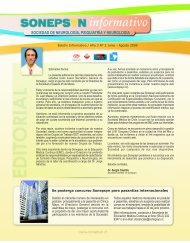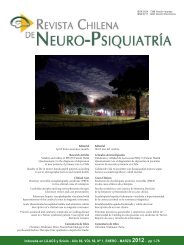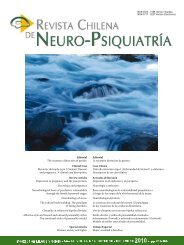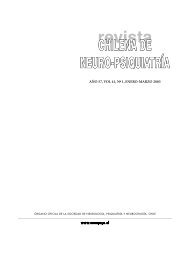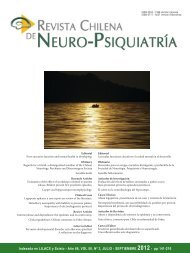revista_chilena_neur.. - Sonepsyn
revista_chilena_neur.. - Sonepsyn
revista_chilena_neur.. - Sonepsyn
Create successful ePaper yourself
Turn your PDF publications into a flip-book with our unique Google optimized e-Paper software.
DAVID ROJAS-ZALAZAR et al.<br />
long-lasting remission of acromegalic disease. Clin<br />
Endocrinol (Oxf) 2007; 66: 538-42.<br />
20. Damjanovic SS, Neskovic A N, Petakov M S, et<br />
al. Clinical indicators of biochemical remission<br />
in acromegaly: does incomplete disease control<br />
always mean therapeutic failure? Clin Endocrinol<br />
(Oxf) 2005; 62: 410-7.<br />
21. Kawamata T, Kubo O, Hori T. Surgical removal of<br />
growth hormone-secreting pituitary adenomas<br />
with intensive microsurgical pseudocapsule resection<br />
results in complete remission of acromegaly.<br />
Neurosurg Rev 2005; 28: 201-8.<br />
22. Feelders RA, Bidlingmaier M, Strasburger CJ,<br />
et al. Postoperative evaluation of patients with<br />
acromegaly: clinical significance and timing of<br />
oral glucose tolerance testing and measurement<br />
of (free) insulin-like growth factor I, acid-labile<br />
subunit, and growth hormone-binding protein<br />
levels. J Clin Endocrinol Metab 2005; 90: 6480-9.<br />
23. Kristof RA, Neuloh G, Redel L, Klingmuller D,<br />
Schramm J. Reliability of the oral glucose tolerance<br />
test in the early postoperative assessment<br />
of acromegaly remission. J Neurosurg 2002; 97:<br />
1282-6.<br />
24. Minniti G, Jaffrain-Rea ML, Esposito V, Santoro<br />
A, Tamburrano G, Cantore G. Evolving criteria for<br />
post-operative biochemical remission of acromegaly:<br />
can we achieve a definitive cure? An audit of<br />
surgical results on a large series and a review of the<br />
literature. Endocr Relat Cancer 2003; 10: 611-9.<br />
25. Abosch A, Tyrrell JB, Lamborn KR, Hannegan L<br />
T, Applebury CB, Wilson CB. Transsphenoidal<br />
microsurgery for growth hormone-secreting pituitary<br />
adenomas: initial outcome and long-term<br />
results. J Clin Endocrinol Metab 1998; 83: 3411-8.<br />
26. Gondim JA, Ferraz T, Mota I, et al. Outcome<br />
of surgical intrasellar growth hormone tumor<br />
performed by a pituitary specialist surgeon in a<br />
developing country. Surg Neurol 2008.<br />
27. Holdaway IM, Bolland MJ, Gamble GG. A meta<br />
analysis of lowering serum levels of GH and IGF1<br />
on mortality in acromegaly. Eur J Endocrinol<br />
2008; 159: 89-95.<br />
28. Freda PU, Landman RE, Sundeen RE, Post KD.<br />
Gender and age in the biochemical assessment of<br />
cure of acromegaly. Pituitary 2001; 4: 163-71.<br />
29. Trepp R, Stettler C, Zwahlen M, Seiler R, Diem<br />
P, Christ ER. Treatment outcomes and mortality<br />
of 94 patients with acromegaly. Acta Neurochir<br />
(Wien) 2005; 147: 243-51; discussion 250-1.<br />
30. Bourdelot A, Coste J, Hazebroucq V, et al. Clinical,<br />
hormonal and magnetic resonance imaging (MRI)<br />
predictors of transsphenoidal surgery outcome in<br />
acromegaly. Eur J Endocrinol 2004; 150: 763-71.<br />
31. Shimon I, Cohen ZR, Ram Z, Hadani M.<br />
Transsphenoidal surgery for acromegaly: endocrinological<br />
follow-up of 98 patients. Neurosurgery<br />
2001; 48: 1239-43; discussion 1244-5.<br />
32. Nomikos P, Buchfelder M, Fahlbusch R. The<br />
outcome of surgery in 668 patients with acromegaly<br />
using current criteria of biochemical ‘cure’.<br />
Eur J Endocrinol 2005; 152: 379-87.<br />
33. Powell JS, Wardlaw SL, Post KD, Freda PU. Outcome<br />
of radiotherapy for acromegaly using normalization<br />
of insulin-like growth factor I to define<br />
cure. J Clin Endocrinol Metab 2000; 85: 2068-71.<br />
34. Gejman R, Swearingen B, Hedley-Whyte E T. Role<br />
of Ki-67 proliferation index and p53 expression<br />
in predicting progression of pituitary adenomas.<br />
Hum Pathol 2008; 39: 758-66.<br />
35. Swearingen B, Barker FGN, Katznelson L, et al.<br />
Long-term mortality after transsphenoidal surgery<br />
and adjunctive therapy for acromegaly. J Clin Endocrinol<br />
Metab 1998; 83: 3419-26.<br />
36. Ludecke DK, Abe T. Transsphenoidal microsurgery<br />
for newly diagnosed acromegaly: a personal view<br />
after more than 1,000 operations. Neuroendocrinology<br />
2006; 83: 230-9.<br />
37. Krieger MD, Couldwell WT, Weiss MH. Assessment<br />
of long-term remission of acromegaly<br />
following surgery. J Neurosurg 2003; 98: 719-24.<br />
38. Kreutzer J, Vance ML, Lopes MB, Laws ERJ. Surgical<br />
management of GH-secreting pituitary adenomas:<br />
an outcome study using modern remission<br />
criteria. J Clin Endocrinol Metab 2001; 86: 4072-7.<br />
39. Jallad RS, Musolino NR, Salgado LR, Bronstein<br />
MD. Treatment of acromegaly: is there still a place<br />
for radiotherapy? Pituitary 2007; 10: 53-9.<br />
40. JJ, JS, NP, Laws ER, LS, Vance ML. Gamma Knife<br />
Radiosurgery for Acromegaly: Outcomes After<br />
Failed Transsphenoidal Surgery. Neurosurgery<br />
2008; 62: 1262-70.<br />
REV CHIL NEURO-PSIQUIAT 2011; 49 (1): 37-46<br />
www.sonepsyn.cl<br />
45



